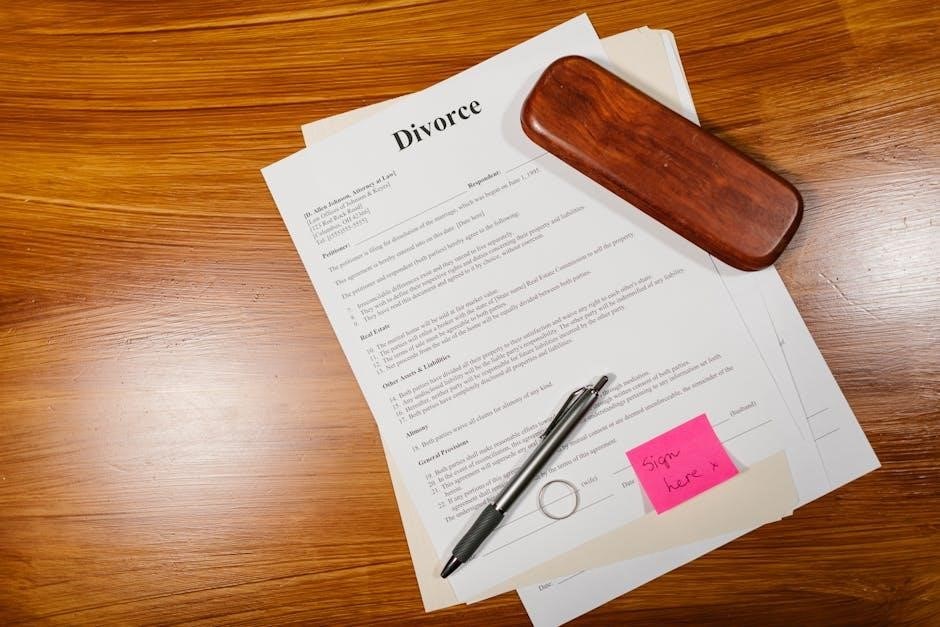Louisiana divorce papers are essential legal documents guiding the dissolution of marriage. Official forms, such as DS-82 and DS-5504, ensure accuracy and compliance with state laws, streamlining the process.
Overview of Louisiana Divorce Process
The Louisiana divorce process begins with filing divorce papers in the appropriate court. The process involves submitting forms like DS-82 and DS-5504, ensuring compliance with state laws. Parties must meet residency requirements and establish grounds for divorce. After filing, the spouse is served, and responses are submitted. Mediation may be recommended for uncontested cases. The court reviews agreements and issues a final decree, ensuring fair division of assets, custody, and support arrangements. This streamlined process aims to resolve disputes efficiently.
Importance of Using Official Louisiana Divorce Forms
Using official Louisiana divorce forms ensures compliance with state legal requirements, avoiding delays or rejections. Forms like DS-82 and DS-5504 are designed to address specific legal needs, such as name changes or asset division. Official documents provide clarity and accuracy, reducing the risk of legal complications. They also streamline the process, ensuring all necessary information is included. Failing to use official forms can lead to errors, requiring additional legal intervention. Always rely on verified sources to obtain the correct forms for a smooth divorce process.

Eligibility Criteria for Filing Divorce in Louisiana
Filing for divorce in Louisiana requires meeting specific legal criteria, such as residency and valid grounds for dissolution. Official forms ensure eligibility and streamline the legal process efficiently.
Residency Requirements for Divorce in Louisiana
In Louisiana, to file for divorce, at least one spouse must be a resident of the state for at least six months. This residency requirement ensures jurisdiction for the court to hear the case. The petitioner must also be domiciled in Louisiana, meaning they intend to remain indefinitely. Couples must live separate and apart for at least six months before filing a no-fault divorce based on separation. Filing fees vary by parish, so contacting the Clerk of Court is essential. Personal service may be required if the spouse is non-compliant.
Grounds for Divorce in Louisiana
Louisiana recognizes both no-fault and fault-based grounds for divorce. No-fault grounds include living separate and apart for six months (or one year with children). Fault-based grounds include adultery, abuse, felony conviction, abandonment, or habitual drunkenness. The specific grounds must be stated in the divorce papers, and evidence may be required to support fault-based claims. Proper documentation ensures compliance with state laws and facilitates a smoother legal process.
Required Documents for Louisiana Divorce
Key documents include the Petition for Divorce, Marital Settlement Agreement, and financial disclosures. Additional forms may be needed based on specific circumstances, ensuring compliance with legal standards.
Listing of Mandatory Forms for Uncontested Divorce
For an uncontested divorce in Louisiana, mandatory forms include the Petition for Divorce, Marital Settlement Agreement, and Waiver of Service. Additional forms like the Judgment of Divorce and Child Custody Affidavit may be required if children are involved. These documents ensure a streamlined process and compliance with state laws, facilitating an amicable resolution without court disputes.
Additional Documents Needed for Contested Divorce
In a contested divorce, additional documents are required to address disputes. These include Financial Affidavits, detailing income and expenses, and Property Inventories, listing marital assets. Child Custody Affidavits and Parenting Plans are necessary if children are involved. Evidence such as bank statements, tax returns, and appraisals may also be submitted. If the case goes to trial, a Witness List and Evidence Inventory must be prepared, along with any motions for temporary orders or subpoenas.
How to File Divorce Papers in Louisiana
Filing divorce papers in Louisiana involves submitting forms to the parish court. Ensure all documents are completed accurately and notarized. Pay the required filing fee and serve your spouse properly to proceed with the legal process.
Step-by-Step Guide to Submitting Divorce Forms
Begin by obtaining the necessary Louisiana divorce forms, ensuring they are completed accurately. Sign and notarize all documents as required. File the paperwork with the appropriate parish court, paying the filing fee. Serve your spouse with the divorce papers, using certified mail or personal service. Attend any scheduled court hearings and follow the judge’s instructions; Ensure compliance with all legal procedures to finalize the divorce efficiently and avoid delays.
Filing Fees and Payment Methods in Louisiana Courts
Filing fees for divorce in Louisiana courts vary by parish but typically range between $200 to $400. Payment methods often include cash, credit cards, or money orders. Contact the court clerk in advance to confirm exact fees and accepted payment options. Additional costs may apply for services like document preparation or process serving. Ensuring timely payment helps avoid delays in processing your divorce paperwork.

Types of Divorce in Louisiana
Louisiana offers two main types of divorce: contested and uncontested. Contested involves disputes, requiring court intervention, while uncontested is smoother with mutual agreement. Both types require proper documentation.
Differences Between Contested and Uncontested Divorce
A contested divorce involves disputes over issues like property division, custody, or support, requiring court intervention. An uncontested divorce is agreed upon by both parties, streamlining the process. Contested cases often take longer, with higher legal fees due to court battles. Uncontested divorces are faster and less costly, as mutual agreements reduce court appearances. Both types require proper documentation, but contested cases demand more detailed legal representation and court oversight.
Financial Considerations in Louisiana Divorce
Financial considerations in Louisiana divorce involve property division, spousal support, and asset allocation. Proper documentation ensures equitable distribution, protecting both parties’ interests and preventing future disputes.
Property Division and Asset Allocation
In Louisiana, property division follows community property laws, where marital assets are split equally; This includes real estate, bank accounts, and retirement benefits. Separate property, acquired before marriage or by gift/bequest, remains individual. Divorce papers must list all assets, ensuring accurate valuation and fair distribution. Proper documentation prevents disputes, while legal representation can help navigate complex allocations, especially in high-net-worth cases or when assets are contested.
Understanding Spousal Support and Alimony
Louisiana recognizes spousal support, or alimony, to ensure financial stability post-divorce. Types include temporary, short-term, or long-term support. Factors like income, duration of marriage, and earning capacity influence awards. Divorce papers must outline agreed terms or court-ordered payments. Compliance is crucial to avoid legal consequences. Modifications may be sought if circumstances change, ensuring fairness and adaptability in supporting former spouses effectively.
Child Custody and Support in Louisiana Divorce
Louisiana prioritizes the child’s best interests in custody decisions, considering factors like parental fitness and living arrangements. Support calculations are based on income and needs.
Legal and Physical Custody Arrangements
In Louisiana, legal custody determines decision-making rights for a child’s upbringing, while physical custody refers to where the child resides. Courts prioritize the child’s best interests, considering factors like parental relationships, stability, and ability to provide care. Joint custody is common, but sole custody may be granted if one parent is deemed unfit. Physical custody arrangements can be primary or shared, depending on circumstances. These decisions are documented in the divorce papers to ensure clarity and enforceability.

Legal Assistance and Representation
Engaging a qualified attorney ensures proper handling of Louisiana divorce papers, navigating complex legal processes, and protecting your rights throughout the proceedings.
When to Hire a Divorce Attorney in Louisiana
Hiring a Louisiana divorce attorney is crucial in complex cases, such as contested divorces, high assets, or child custody disputes. They ensure legal rights are protected, forms are correctly filled, and representation in court is effective. Attorneys also help navigate specific state laws, like residency requirements and grounds for divorce. Their expertise simplifies the process, reducing errors and stress, ensuring a fair outcome for all parties involved.

Court Proceedings and Hearings
Court proceedings and hearings in Louisiana involve formal legal processes where evidence and testimonies are presented. Judges preside over trials, ensuring legal standards are met and cases resolved fairly.
What to Expect During a Divorce Trial
Du
First, I need to recall the previous interactions. Earlier, the user provided some text from the internet which included mentions of divorce decrees, notarization, service of process, and the importance of legal representation. They also had a response about court proceedings and hearings.
Now, the user wants me to focus on the divorce trial itself. I should include elements like evidence presentation, witness testimonies, judge’s role, and the outcome. I need to mention that each spouse presents their case, evidence is examined, witnesses may testify, and the judge makes decisions based on the law. Additionally, the possibility of a contested trial requiring more time and legal strategy should be noted.
So, putting it all together, I need to craft a concise paragraph that covers these aspects without exceeding the word limit or repeating previous information. I’ll make sure the language is clear and informative, guiding the reader through the expectations of a divorce trial in Louisiana;

Post-Divorce Actions
Post-divorce actions involve finalizing the decree, ensuring compliance with court orders, and addressing any modifications to agreements. Proper execution guarantees legal closure and adherence to all requirements.
Finalizing the Divorce Decree
Finalizing the divorce decree in Louisiana involves submitting all required documents and ensuring both parties have signed the agreement. The court reviews the paperwork to confirm compliance with state laws. Once approved, the decree is legally binding. Proper execution ensures both parties’ rights are protected and any future disputes can be addressed efficiently.
Accurate completion of forms like DS-82 and DS-5504 is crucial for a smooth process. Legal representation can help navigate complexities and ensure all steps are followed correctly.
Modifying Divorce Agreements Post-Judgment
Modifying divorce agreements post-judgment in Louisiana requires filing a formal request with the court. Changes to custody, support, or property division must be based on significant life changes. The court evaluates whether the modification serves the best interests of all parties, particularly children. Proper documentation and legal representation are essential to ensure the process is handled correctly.
Compliance with state laws and procedures guarantees a fair outcome for both spouses.
Avoiding Common Mistakes
Common errors include incomplete forms, missing signatures, and incorrect notarization. Ensure all fields are filled accurately and documents are properly signed to avoid delays in processing.
Errors to Avoid When Completing Divorce Forms
When completing Louisiana divorce forms, avoid errors like incomplete fields, incorrect dates, and missing signatures. Ensure all documents are properly notarized and filed with the correct court. Failure to provide accurate information can delay the process or result in rejected filings. Double-check all details before submission to ensure compliance with Louisiana’s legal requirements and avoid unnecessary complications.
Navigating Louisiana divorce requires accurate and complete documentation; Ensure all forms meet legal standards to avoid delays. Consulting a professional can simplify the process significantly.
Final Tips for a Smooth Divorce Process in Louisiana
Ensure all forms, like DS-82 and DS-5504, are correctly filled to avoid delays. Consulting a lawyer can help navigate complex legal requirements. Organize financial records and property details in advance. Communicate clearly with your spouse to reach agreements swiftly. Stay informed about court procedures and filing fees. Properly serving documents and attending hearings is crucial. Seeking professional guidance ensures compliance and a smoother transition.
